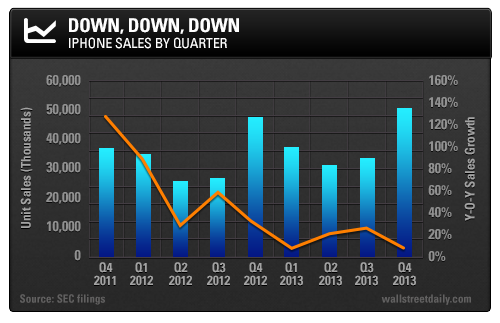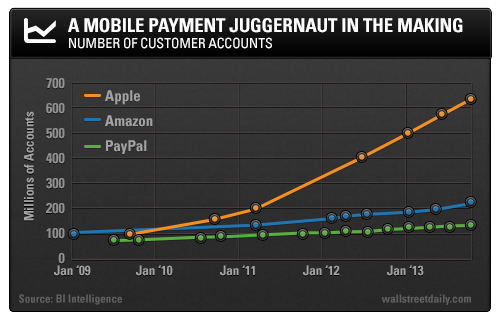After the bell on Monday, tech icon, Apple (AAPL), reported results.
On the one hand, the company delivered record profits of $14.50 per share, when analysts were expecting $14.05.
But when it came to iPhone sales during the all-important holiday quarter, Apple whiffed hard enough that the fans in the bleacher seats could feel it.
The company only sold 51 million iPhones – a full four million shy of analysts’ estimates. At an average selling price of $637, that works out to $2.5 billion in missed sales. Like I said, big whiff!
As a result, the market has taken Apple hostage.
Following the report, shares fell as much as 9%, vaporizing roughly $40 billion in market value.
Now, by no means is Apple in danger of going out of business. Not with over $13 billion in quarterly profit and a cash stockpile closing in on $160 billion.
However, an ominous trend is developing, pointing to an imminent day of reckoning between CEO Tim Cook and shareholders.
Or as Forbes’ Robert Hof put it, “Investors are getting even more restless.”
Indeed! Here’s why it’s absolutely justified – and, most importantly, how you can safely leverage the situation for your ultimate profit…
How Do You Like Them (Rotten) Apples?
Apple’s unfathomable smartphone shortfall comes at a time when the rest of the industry is firing on all cylinders.
In the last 24 hours, in fact, technology research group, IDC, confirmed that global smartphone sales zoomed 38% last year. They topped one billion units for the first time ever.
Analysts are calling for similarly heady growth of 26% in 2014.
Now, you’d think that trend would be Apple’s friend. Think again!
The bulk of the expected smartphone sales will be “low-quality growth,” according to BNP Paribas analyst, Peter Yu.
Translation: Cheap smartphones, selling for less than $150, will account for the majority of smartphone sales this year.
Pardon the Captain Obvious statement here, but that’s a price point Apple can’t touch.
Consumers’ preference for lower-priced smartphones, and Apple’s inability to compete, is already materializing in the data, too.
Over the last three quarters, Apple’s iPhone sales growth rate plummeted from around 20% to less than 7%, on a year-over-year basis.

Meanwhile, market share data reflects a similarly ominous trend. Whereas Apple sold nearly 20 million more iPhones in 2013 than 2012, its market share fell four percentage points to 15%.
Innovate or Die
Ever since the late Steve Jobs unveiled the company’s first iPhone in 2007, it’s been the main driver of Apple’s revenue. (In the last quarter, it accounted for 56% of sales.)
Based on the latest numbers, I’m afraid Apple’s eye-popping iPhone run is drawing to a close. That means it’s time to innovate (again) or die.
Of course, that’s always been the story with Apple. It needs to introduce new product categories – and instantly dominate the market. Otherwise, its stock is destined to fail.
When Steve Jobs was at the helm, no one ever questioned the company’s ability to do just that. With Tim Cook in charge, though, it’s not such a sure thing.
He’s just not the same type of visionary as Steve Jobs. Frankly, I don’t think anyone will ever be.
And the fact that shares are selling off after the quarterly report – even though Cook continues to promise Apple will launch new products this year (iWatch anyone?) – shows that the lack of confidence is widespread.
Now, Cook might not be able to match Jobs’ innovative abilities. But he’s no dummy. After all, you don’t become the successor at Apple for your lack of business acumen.
He made one comment during yesterday’s conference call that leads me to believe he’s about to make his mark on the world.
When pressed about mobile payments, he said, “We are seeing that people love being able to buy content, whether it’s music or movies or books, from their iPhone using Touch ID. It’s incredibly simple and easy and elegant – and it’s clear [that] there’s a lot of opportunity there.”
When asked about the same thing on the previous conference call, he curtly responded that mobile payment technology is “in its infancy.”
Apparently, it’s grown up (fast) in the span of several months. And therein lies his opportunity…
Get Ready for the Mobile Payment Boom
For years, I’ve contested that mobile payments would never take off until the security issues were resolved. Apple took care of that by incorporating biometric authentication into its latest iPhone.
So in order to take over the world, all Tim Cook needs to do now is start letting people use Touch ID to buy anything they want.
Think about it. Apple lays claim to one of the most valuable assets in the world – over 600 million user accounts, most of which are already linked to a credit card.

That’s more than Amazon.com (AMZN) and PayPal combined, based on BI Intelligence’s estimates from late 2013.
So by letting users pay for goods and services from their iPhone with their Apple ID, verified by Touch ID, Apple would instantly dominate the mobile payment market.
While it wouldn’t be as simple as flipping a switch, it’d be pretty darn close.
And it would definitely be much easier for Cook than trying to come up with a completely new, must-own consumer electronic device.
Now, you know I’ve always advocated investing in Apple’s stock smartly, instead of simply buying the stock at any price. I have to admit, though, my colleague, Karim Rahemtulla, has come up with the most ingenious way yet to bet on the company’s next big innovation.
